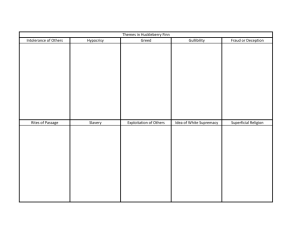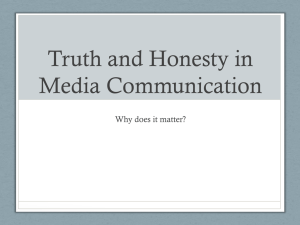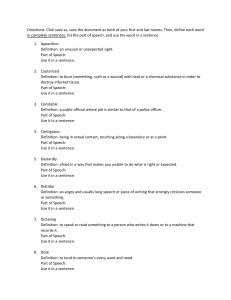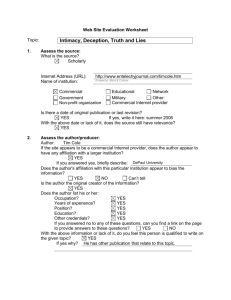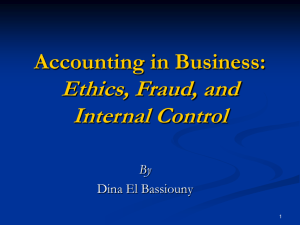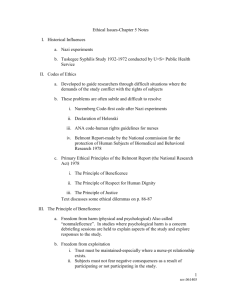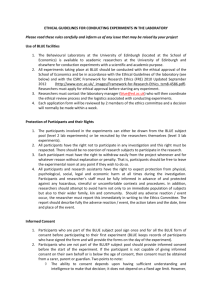4-Ethics in Research..
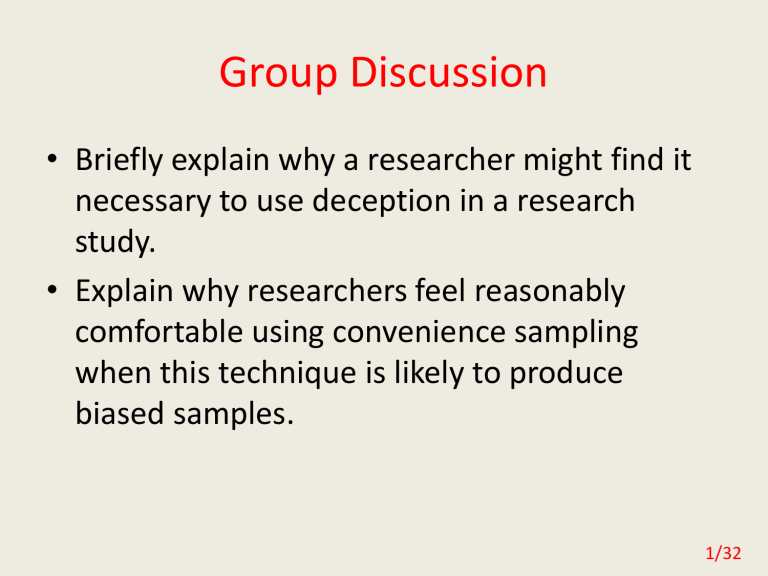
Group Discussion
• Briefly explain why a researcher might find it necessary to use deception in a research study.
• Explain why researchers feel reasonably comfortable using convenience sampling when this technique is likely to produce biased samples.
1/32
Ethics in Research
Chapter 4
2/32
Ethics
Research ethics concerns the responsibility of researchers to be honest and respectful to all individuals who are affected by their research studies or their reports of the studies’ results.
3/32
2 ethical responsibilities
Researchers have two basic categories of ethical responsibility:
( 1) responsibility to ensure the welfare and dignity of the individuals, both human and nonhuman, who participate in their research studies, and
( 2) responsibility to ensure that public reports of their research are accurate and honest.
4/32
History
5/32
Unethical Examples
• Breaking and re-breaking of bones ( to see how many times they could be broken before healing failed to occur) Nazi
• Patients had been injected with live cancer cells
(Jewish Chronic Disease Hospital, NY, 1963)
• 400 men had been left to suffer with syphilis long after a cure ( penicillin) was available. ( Tuskegee, Alabama,
1932-72 )
• Milgram’s study sustained no physical harm, they suffered shame and embarrassment for having behaved inhumanely toward their fellow human beings.( 1963 )
6/32
Milgram’s
• Please continue.
• The experiment requires that you continue.
• It is absolutely essential that you continue.
• You have no other choice, you must go on.
7/32
Ethics Codes
8/32
First Code
• Nuremberg Code , a set of 10 guidelines for the ethical treatment of human participants in research. 1949
9/32
The Belmont Report
25 years later
• National Research Act. 1974
• The Belmont Report, 1979
10/32
The Belmont Report 1979
( 1) Individuals should consent to participate in studies and those who cannot give their consent, such as children, people with diminished abilities, and prisoners, need to be protected.
( 2) The researcher not harm the participants, minimize risks, and maximize possible benefits.
( 3) fairness in procedures for selecting participants.
11/32
APA Guide
• The researcher is obligated to protect participants from physical or psychological harm.
• During or after a study, participants may feel increased anxiety, anger, lower self- esteem, or mild depression, especially in situations in which they feel they have been cheated, tricked, deceived, or insulted .
12/32
Table 4.2 (APA guide)
The general concept of informed consent is that human participants should be given complete information about the research and their roles in it before agreeing to participate.
13/32
Clinical Equipoise
14/32
Clinical Equipoise
This means that a researcher can compare treatments when:
• a. there is honest uncertainty about which treatment is best.
• b. there is honest professional disagreement among experts concerning which treatment is best.
15/32
Explain why and ensure understanding
• Researchers often tell participants exactly what will be done in the study but do not explain why .
• Simply telling participants about the research does not necessarily mean they are informed, especially in situations in which the participants may not be competent enough to understand .
16/32
Voluntary Participation
Participants may feel coerced to participate or perceive that they have limited choice.
17/32
Deception
• Passive deception ( or omission) is the withholding or omitting of information; the researcher intentionally does not tell participants some information about the study.
• Active deception ( or commission) is the presenting of misinformation about the study to participants. The most common form of active deception is misleading participants about the specific purpose of the study.
18/32
Justified Deception
• The deception must be justified in terms of some significant benefit that outweighs the risk to the participants. The researcher must consider all alternatives to deception and must justify the rejection of any alternative procedures.
19/32
Debriefing
The final point is that deceived participants must receive a debriefing that provides a full description of the true purpose of the study, including the use and purpose of deception , after the study is completed.
20/32
Confidentiality
The APA ethical guidelines require that researchers ensure the confidentiality of their research participants.
Ensuring that participants’ records are kept anonymous.
21/32
The Institutional Review Board
Each institution or agency is required to establish a committee called an Institutional
Review Board ( IRB), which is composed of both scientists and nonscientists.
22/32
ETHICAL ISSUES AND SCIENTIFIC
INTEGRITY
23/32
Reporting of Research
a. Researchers do not fabricate data . (They do not make false, deceptive, or fraudulent statements concerning their publications or research findings.) b. If they discover significant errors in their published data, they take reasonable steps to correct such errors in a correction, re-traction, erratum, or other appropriate publication means. c.
They do not present portions of another’s work or data as their own , even if the other work or data source is cited occasionally.
24/32
Error and fraud
• It is important to distinguish between error and fraud.
• Fraud, is an explicit effort to falsify or misrepresent data.
Watch the video
Fredric Mishkin a full professor at Columbia
Business School.
25/32
Safeguards Against Fraud
26/32
Safeguards Against Fraud
• A safeguard against fraud is peer review, which takes place when a researcher submits a research article for publication.
• Replication is repetition of a research study using the same basic procedures used in the original to test the accuracy.
27/32
Plagiarism
You can literally copy an entire paper word for word and present it as your own work or you can copy and paste passages from articles and sites found on the Internet.
28/32
What about
You may be inspired by someone’s ideas or influenced by the phrases someone used to express a concept.
After working on a project for an extended time, it can become difficult to separate your own words and ideas from those that come to you from outside sources. As a result, outside ideas and phrases can appear in your paper without appropriate citation.
29/32
